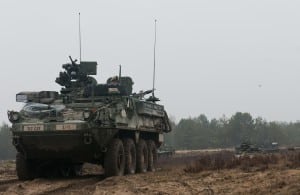The Army said Wednesday it has “high confidence” in its program to upgrade its Stryker vehicles with a new 30mm Medium Caliber Weapon System (MCWS) after a group of vendors dropped out of the program, with the service readying to receive final proposals this August.
Col. William Venable, the Stryker Brigade Combat Team Project Manager, told reporters the MCWS program is also on track to begin delivering initial Strykers integrated with MCWS by September 2022.

“[Vendors] are constantly assessing from a technical standpoint whether they can achieve the requirement and, of course, from an affordability standpoint whether they’ll invest the million of dollars to meet the requirement that will give them a chance of winning,” Venable said. “I wasn’t inside any of those discussions about why they chose to drop off. I know that one of the vendors chose to drop out because it wasn’t on a good technical glide path to achieve the requirement in the timeframe of the solicitation. And the other one was affordability. They didn’t feel the investment required to meet the program’s requirements was going to result in a good chance to win.”
Venable did not name the vendors who withdrew from the first phase MCWS, which began with six companies participating in a design integration study.
The Army announced last May it selected General Dynamics Land Systems [GD], Raytheon [RTN], Pratt & Miller Engineering & Fabrication Inc., Leonardo DRS, and Kollsman, Inc. for MCWS Phase 1, with each company receiving Double V-Hull A1 Stryker and a 30mm XM813 cannon and then asked to integrate a turret and fire control system of their choice (Defense Daily, May 23).
EOS Defense Systems USA, Inc. was awarded the sixth contract after the company won a successful protest.
Venable said while requirements for MCWS have not changed, the Army did adjust its evaluation criteria in response to concerns over the pandemic’s impact on “availability of facilities and supplier base.”
“From our perspective, the requirements as far as what we’re asking them to do, have been stable and we recognized the importance of a stable requirement very early on. We have adjusted the evaluation strategy in order to maintain that competition as robust as we can,” Venable said.
Lt. Col. Jim Polak, Product Manager for Stryker Future Operations, told reporters the Army is confident it will receive promising MCWS proposals this August as it looks to begin live fire tests this fall to inform a source selection decision.
“We have high confidence that we will have enough vendors that will provide a best value winner and good, resourceful data for the source selection authority to make a choice,” Polak said.